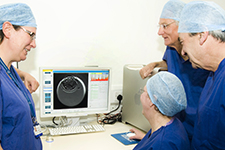Cutting edge equipment donated to help high risk pregnancies
 The Centre for Reproductive Medicine at University Hospital, Coventry and the University of Warwick can now help more couples who are experiencing difficulties with pregnancy, with the help of a first class Embryoscope.
The Centre for Reproductive Medicine at University Hospital, Coventry and the University of Warwick can now help more couples who are experiencing difficulties with pregnancy, with the help of a first class Embryoscope.
The £65,000 Embryoscope was kindly donated for research by the Warwickshire Private Hospital (WPH) Charitable Trust and this week Trustees from the charity were able to see this piece of important equipment in action.
The Embryoscope provides detailed, non-invasive scanning of individual human embryos throughout their first week of development, allowing cutting edge interpretation of embryo quality. This directly benefits couples having IVF treatment, while the research will help women with high-risk pregnancies.
Professor Geraldine Hartshorne, Professorial Fellow at Warwick Medical School and Scientific Director of the Centre for Reproductive Medicine, who leads the embryology research, is offering IVF patients the opportunity to use the Embryoscope in their treatment and to participate in the research. She said: “The Embryoscope helps to diagnose embryos with the best chances of starting a pregnancy, which is great news for IVF patients. Taking part in the research does not affect the couple’s IVF treatment at all, but it provides us with the means to study how embryos communicate with the mother in the crucial first few days of pregnancy. We are thrilled with the early results from the Embryoscope and wish to publicly thank the WPH Charitable Trust for its support.”
Professor of Obstetrics and Honorary Consultant Obstetrician, Siobhan Quenby said: “On behalf of UHCW and the University of Warwick I would like to thank WPH Charitable Trust for this generous donation. The Embryoscope will be used in research to study the very early causes of pregnancy complications and how implantation can be improved.
“We hope that this research will help to develop new treatments to improve the likelihood of successful pregnancies and reduce problems that cause recurrent failure and pregnancy complications.”
For further information contact Luke Harrison, Communications Manager on +44 (0)2476 574255/150483, m: +44(0)7920 531221 or luke.harrison@warwick.ac.uk.
